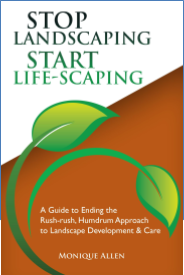FOR IMMEDIATE RELEASE
Monique Allen crafts a guide to creating an environment that elevates your life
MEDFIELD, Massachusetts – We all want to be our best selves and that means having the ability to rest and recharge in holistic ways. Nature has great power to inspire imagination and settle the nervous system, and many of us have access to nature right at home yet it often causes more stress than calm. Author Monique Allen is shedding light on how to transform landscapes into powerful places that can recharge our batteries, uplift our souls, and delight our senses.
In Stop Landscaping, Start Life-Scaping: A Guide to Ending the Rush-rush, Humdrum Approach to Landscape Development & Care (March 23, 2020, Ingram Sparks) the landscape designer and developer Allen explains how to imagine, build and care for these spaces to be integral experience-makers in our lives. With over 35 years of experience in the field, Allen shares stories, frank examples, and dozens of practical tips that will guide you through the process of creating an outdoor environment that is fulfilling and an extension of yourself.
In these pages, Allen calls for a paradigm shift in how we design, build and manage landscapes, for home gardeners and seasoned professionals alike. Detailing various concepts including why systems-thinking is important to your success, how to picture your plan and assemble your construction team, why long-term care strategies must be an upfront consideration, and how to become a loving partner and steward of your land, Allen shows how your landscape is your connection to nature and ultimately the lifeline to inner peace and the well-being of our communities.
ABOUT THE AUTHOR
 MONIQUE ALLEN is the Founder & Creative Director of The Garden Continuum, an award-winning landscape design/build and fine gardening company. She has spent 35 years as a gardener, designer, contractor, business owner, and employer. She is a master creator, professional employer, and skillful industry advocate. Her impressive project development and care background allow her to choose the clients she works for and the employees she hires while maintaining her staunch commitment to our environment. In addition to 35 years in the business, Monique is also an accomplished business coach, industry blogger, and has just completed her first full-length book on her signature method of Life-Scaping. For more information visit Monique Allen at thegardencontinuum.com.
MONIQUE ALLEN is the Founder & Creative Director of The Garden Continuum, an award-winning landscape design/build and fine gardening company. She has spent 35 years as a gardener, designer, contractor, business owner, and employer. She is a master creator, professional employer, and skillful industry advocate. Her impressive project development and care background allow her to choose the clients she works for and the employees she hires while maintaining her staunch commitment to our environment. In addition to 35 years in the business, Monique is also an accomplished business coach, industry blogger, and has just completed her first full-length book on her signature method of Life-Scaping. For more information visit Monique Allen at thegardencontinuum.com.
ABOUT THE BOOK

“Stop Landscaping, Start Life-Scaping: A Guide to Ending the Rush-Rush, Humdrum Approach to Landscape Development and Care”
Monique Allen | March 23, 2020 | Ingram Sparks
Paperback ISBN:978-0-578-61941-5 | Price: $24.95
Nonfiction | Home Improvement | How-To
“Stop Landscaping, Start Life-Scaping is an inviting work for gardeners hoping to discover their true selves.” — Foreword Clarion Review 4-star review
In an interview, MONIQUE ALLEN can discuss:
- How your yard can become a Life-Scape
- The importance of caring for the environment and supporting environmental causes
- Why long term care needs to be considered from the beginning
- How your environment impacts your mood and day-to-day activities
- Well tested gardening tips
- What the landscaping industry has done in the past, and why we need to shift to a more mindful way of interacting with our land
An Interview with MONIQUE ALLEN
1. Can you explain what “Life-Scaping” means to you?
A Life-Scape is a place of rest, recharge and peace. It isn’t like a spa or resort where you just go and get waited on. It’s more of a place to go to be still in your mind. Even if you are actively gardening, you can be still in the mind while doing it. A Life-Scape is a safe place to go and think, or to play, or to visit with others. It doesn’t ask anything of you that you don’t want to give it. You love it and it loves you back. You tend and invest in it because you want to. There is none of the begrudging – “UGH, I have to mow the lawn. Crap! Have to weed again!” This isn’t how one views or interacts with a Life-Scape. You may be of means and able to hire someone to build it and tend it so you do nothing. Or, you may do all the work yourself. No matter the mix, the place, when you go to it has the power to regulate your experience in positive ways.
2. How did you first come to the realization that the landscaping industry needed a paradigm shift?
Lots of unhappy people were coming to me with complaints about their dissatisfaction with their yards and all the services they have had in the past. I know that my co-trades people are good people — no one wants to do bad work. But bad work was happening — is happening — everywhere. It’s happening more than it isn’t happening. I noticed that the landscape had become a thing to own and manage. It was no longer considered a living system by the masses. And until we get back there, we are going to continue to struggle to succeed and suffer losses and disappointments.
3. Why is it so important to change the way we think of and interact with land, especially now?
There is so much talk about being GREEN — clean air, clean water, pesticide-free foods, the list goes on. It’s a travesty that we can’t make the connection between the struggles of our planet and the human race to be healthy and the power we have in our own landscapes to have an impact. If every homeowner, every business owner, and every landscape professional just adopted the Life-Scape mindset, we would be able to make amazingly positive impacts on our environment. We need that kind of radical and broad shift to make lasting and sustainable changes.
4. What is your recommendation for a home gardener who wants to start working on their landscape?
Start by considering it’s sentient. It is alive. It is a system. It is interrelated and communicative. When you start to realize that it is a living breathing entity, you start to soften your stance on what is acceptable and what is not. I’m not saying that you go hands-off — I actually think that’s a huge mistake. Rather, I think you start by asking — how can I nurture this space into health? How can I craft the space into one that is enticing to me and my family (or my community if it’s a business or town)?
5. Why is it important to have a long-term care plan for your landscape? Is a long-term care plan important in Life-Scaping?
A long-term care plan represents your acknowledgment that this living system will grow, expand, change, possibly get damaged in weather, be broken, die, get sick, get too big over time. You need to see that there is NOTHING static in this outside environment. We have become so insular and inside focused that we forget that nature evolves and changes. We can’t have a Life-Scape without maintenance and management and care and attention to the important environmental impacts that will sometimes speed up or tip over that evolution.
6. In what ways does your environment affect mental health?
Nature is a living breathing system. When it’s healthy and vibrant, it will emanate positive energy — regulating energy. As humans, we also vibrate with health and wellness or stress and disease. We know when we are near an angry person or a happy person. Nature is the same — but just magnify that to like the 100th power. A healthy, vibrant landscape has the power to regulate our vibration. There is even research now that says that working healthy soils can regulate moods and balance depressive states. That the light waves of the color green can actually mitigate migraine headaches. We are of nature and when we eliminate her from our existence we are all worse for the wear. When we embrace her and visit her and allow ourselves to be close and touch nature, we can actually lift our mood, our mindset, our health, and our outlook.
7. What are the top three most important things to consider when starting to garden or landscape?
First is the environment you are presented to work with. Don’t try to make it something it isn’t already. The most success comes from working in partnership with the nature of your existing surroundings. It’s also far more cost-effective to approach it that way.
Second is the time you give and expect. Landscape development — especially done the Life-Scape way — is not a project, it’s a process. There is certainly a beginning and lots of middle space, but the end… that’s questionable. When you end… you die. When a landscape ends… maybe it’s because you move, or you just stop minding that it’s growing away from your control. Point is, it’s a long game. Knowing that is good. Like pets, like kids, like relationships — we aren’t racing to an end.
Third is the financial investment. Yes, we can be frugal, we can work hard to keep costs down to a point. Be mindful that when we engage in what’s worthy and valuable, we can monitor expenses and certainly should, but avoid cutting corners and quick fixes. In a living system that will bite you in the backside before too long. A Snickers bar for lunch is quick and cheap (and sorta yummy too) but often comes as a sugar crash (or a crappy mood) a few hours later. We need to think holistically even in the realm of financial investments in the landscape.

A former award-winning journalist with national exposure, Marissa now oversees the day-to-day operation of the Books Forward author branding and book marketing firm, along with our indie publishing support sister company Books Fluent.
Born and bred in Louisiana, currently living in New Orleans, she has lived and developed a strong base for our company and authors in Chicago and Nashville. Her journalism work has appeared in USA Today, National Geographic and other major publications. She is now interviewed by media on best practices for book marketing.
